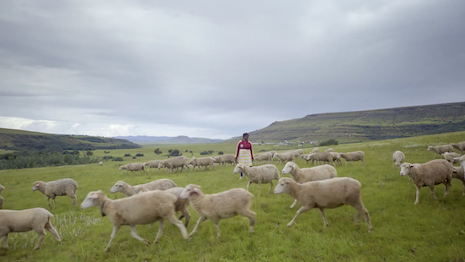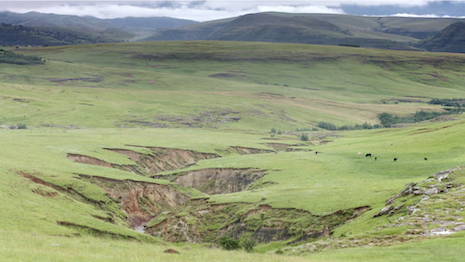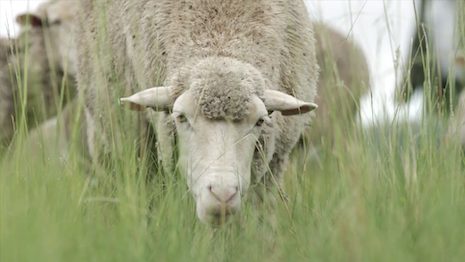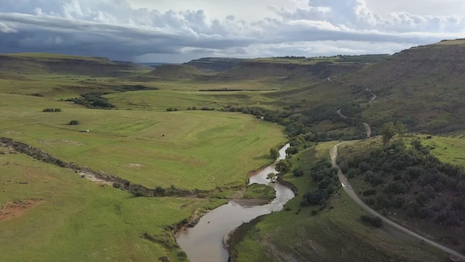 Half of the participating beneficiaries are female thanks to the group's prioritization of inclusion. Image credit: Kering
Half of the participating beneficiaries are female thanks to the group's prioritization of inclusion. Image credit: Kering
French luxury conglomerate Kering is supporting female farmers' shift towards greener herding practices.
Teaming up with environmental nonprofit Conservation International, the company is backing sustainable agriculture in the grasslands of South Africa through the partnership’s “Regenerative Fund for Nature” project. Providing resources to local sheep farmers willing to adopt land-preserving practices, Kering especially focused on small farms run by women, ensuring that they made up 50 percent of the beneficiaries in a continuation of the group’s longstanding tradition of uplifting women.
"Involving women in regenerative agriculture pays significant dividends as women tend to reinvest up to 90 percent of their earnings back into their households on nutrition, food, healthcare and schooling," said Bambi Semroc, senior vice president of sustainable lands and waters at Conservation International, Arlington, Virginia.
"Studies have shown that women make up 45 percent of the global agricultural labor force in developing countries, yet have ownership over less than 20 percent of the land," Ms. Semroc said. "That’s why, through our Conservation South Africa program working to engage 325 small-scale sheepherders in the Kruger to Canyons landscape, we’ve made a significant effort to ensure a growing number of participants are women."
Balancing act
Kering is funding training and workshops to provide education on a lost practice, rotational grazing.
Implementing this mobile form of animal farming keeps the ecosystem balanced and reduces soil degradation, as keeping herds in one place leeches the soil of its nutrients and kills the plant life. This is just as unhealthy for the animals and their byproducts as it is for the land itself.
 The grasslands have long suffered erosion due to heavy strain on the habitats within. Image credit: Kering
The grasslands have long suffered erosion due to heavy strain on the habitats within. Image credit: Kering
Historically, those tending animals would let them wander and rotate them through different pastures and fields, allowing them to do what they would instinctively do in the wild to avoid the loss of their food source. As humans increased demand and crop yields, farmers shifted to stationary practices.
It is for this reason that in South Africa, on the border of Lesotho, erosion has become a crisis.
On Earth Day, we invite you to a special journey in South Africa, in the Drakensberg’s Grasslands, on the Lesotho border. In these remote areas, sheep breeding is the main source of income. But overgrazing is taking its toll, destroying biodiversity and causing dramatic erosion. pic.twitter.com/zjEydl4CNT
— Kering (@KeringGroup) April 22, 2023
"The potential of regenerative agriculture extends beyond the land – producing crops and sustaining livestock – to the people who own and work the land," Ms. Semroc said.
"For rural farming communities, regenerative agriculture can mean long-term, sustainable development that enables farming households to thrive," she said. "But to fully realize the land’s potential, it’s critical that women are involved in these initiatives.”
This is where Kering and Conservation International come in, first launching the Regenerative Fund for Nature in 2021 to address fashion’s supply chain sustainability crises (see story). That same year, Kering was named the most sustainable clothing and accessories retail company in the world by Corporate Knights (see story).
Seeing an environmental problem with luxury’s raw materials, Kering took action.
Together, Kering and Conservation International aim to transition 1 million hectares, or nearly 2.5 million acres, of farms utilizing damaging agricultural practices to regenerative agriculture by 2025.
“We deliberately chose smaller-sized farms that tend to be run and managed by women,” said Marie-Claire Daveu, chief sustainability officer and head of international institutional affairs at Kering, in a statement.
“So, we are thrilled because 50 percent of the farmers participating in this project are women.”
In these remote areas, sheep breeding is the main source of income for many women.
The organization has often tied gender equity and the fight for the livable planet, engaging in collaborative environmental measures toward women’s empowerment throughout its supply chain (see story).
The pilot program in the grasslands is facilitating a fair transition to regenerative farming, ensuring that local women are included in the pioneering effort.
“I understood the idea behind rotational grazing, but had no clue of the purpose,” said Mapheko Mathibel, sheep farmer, in a statement.
“Ever since I joined the Conservation South Africa program, the advantages of leaving grassland fallow have been plain to see,” she said. “Not only are the animals healthier, but food supply is also guaranteed through winter.”
 When the soil is healthier, the grass and plants are healthier as well, resulting in a better diet for the animals grazing. Image credit: Kering
When the soil is healthier, the grass and plants are healthier as well, resulting in a better diet for the animals grazing. Image credit: Kering
Like the other participating women, Ms. Mathibel received a number of funding packages for her farm, hoping to grow her 20-sheep flock.
Raw reform
Many other luxury brands are beginning to recognize the important role that conservation-focused farming and growing practices have in achieving a high-quality product.
For this reason, sourcing has become a hot topic as companies look into their raw products.
 When ecosystems are balanced, the products that come from them, such as cotton and animal byproducts, are going to be of higher quality, making it essential for luxury to take these efforts on. Image credit: Kering
When ecosystems are balanced, the products that come from them, such as cotton and animal byproducts, are going to be of higher quality, making it essential for luxury to take these efforts on. Image credit: Kering
French luxury fashion house Louis Vuitton teamed up with Australian conservation group People for Wildlife to support community-based environmental work and scientific research (see story). The maison, taking an intersectional approach, is using the findings from the efforts to improve the conscious factor of its raw materials.
In November 2022 French luxury conglomerate LVMH took on regenerative agroforestry, also looking to the African continent (see story).
"Nearly 40 percent of earth’s lands have already been converted to cropland and pasture, many of which grow the fibers that become our clothing," Ms. Semroc said.
"To meet [the] rising demand for these fibers without further expanding our pastoral footprint, farmers and nature must work together to sustain soil, water, and biodiversity – regenerative agriculture helps us do that," she said. "It’s the best method we have right now to avoid runaway climate change."